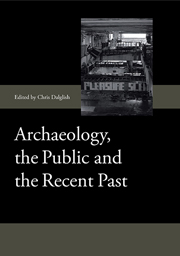Book contents
- Frontmatter
- Contents
- List of Figures and Tables
- List of Contributors
- Archaeologists, Power and the Recent Past
- Part One Constructing Memories, Constructing Communities
- Open-Air Museums, Authenticity and the shaping of Cultural Identity: An Example from the Isle of Man
- Loyal yet Independent: Archaeological Perspectives on Remembering and Forgetting World War I on the Isle of Man
- Public Engagement at Prestongrange: Reflections on a Community Project
- Archaeology for All: Managing Expectations and Learning from the Past for the Future – the Dig Manchester Community Archaeology Experience
- Rediscovering, Preserving and Making Memories at Community Archaeology
- Part Two Engaging the Past, Engaging the Present
- Index
Rediscovering, Preserving and Making Memories at Community Archaeology
from Part One - Constructing Memories, Constructing Communities
Published online by Cambridge University Press: 05 September 2013
- Frontmatter
- Contents
- List of Figures and Tables
- List of Contributors
- Archaeologists, Power and the Recent Past
- Part One Constructing Memories, Constructing Communities
- Open-Air Museums, Authenticity and the shaping of Cultural Identity: An Example from the Isle of Man
- Loyal yet Independent: Archaeological Perspectives on Remembering and Forgetting World War I on the Isle of Man
- Public Engagement at Prestongrange: Reflections on a Community Project
- Archaeology for All: Managing Expectations and Learning from the Past for the Future – the Dig Manchester Community Archaeology Experience
- Rediscovering, Preserving and Making Memories at Community Archaeology
- Part Two Engaging the Past, Engaging the Present
- Index
Summary
Community archaeology is a rapidly expanding approach to archaeological research. Whilst the archaeology itself is central to individual projects, issues of community' may be heavily implicated within the agendas of many project partners. In this paper, I will argue that community archaeology projects are complex arenas in which a variety of agendas are interwoven within both the planned activities and the unplanned outcomes that occur during the life of a project. Drawing on ethnographic evidence of community archaeology from my recently completed doctoral research as well as from recent experience of the proactive delivery of community archaeology I will focus on the role of memory in relation to both the initial design of community archaeology projects and also the ways in which projects come to be understood and valued by those who have supported and/or participated in them. I will identify projects as being arenas in which aspects of social memory can be central to much that is both planned for and experienced by participants. The rediscovery of lost memories, the preserving of fragile memories and the making of new memories will be shown to be especially significant within the narratives aggregating around individual community projects. I identify ‘living memory'sites as being especially meaningful and effective for community archaeology and argue that the event of a community archaeology project can serve as an arena for the construction of community in the present.
- Type
- Chapter
- Information
- Archaeology, the Public and the Recent Past , pp. 77 - 92Publisher: Boydell & BrewerPrint publication year: 2013

